
*
Amanda Wingfield, who lives with her two grown children in a meager St. Louis flat, clings to the halcyon days of her Southern youth and yearns for "happiness and just a little bit of good fortune" for son Tom, a frustrated writer working a mind-numbing warehouse job, and daughter Laura, his painfully shy sister whose collection of delicate glass animals mirrors her own fragility. When Tom succumbs to his mother's constant pleas to find a suitor for Laura, they await the arrival of the Gentleman Caller on whom Amanda has pinned her last hope for her daughter's future.
In the The Glass Menagerie's Wingfields, Tennessee Williams created one of the most vividly etched families in American drama. The autobiographical work originally premiered in Chicago in 1944, starring Laurette Taylor, whose performance as Amanda was universally praised as a defining moment on the American stage. Since Taylor's history-making turn as the woman whose telephone-man husband fell in love with long distance and abandoned her, many a gifted actress has gravitated to the role from Gertrude Lawrence (in the 1950 film version) to Jessica Tandy, Maureen Stapleton, Julie Harris, Joanne Woodward (directed by Paul Newman in a 1987 film), and, in a 1973 television outing for which she was Emmy nominated, Katharine Hepburn.
Because the play so familiar to audiences is awash in thwarted dreams, aching disappointments and melancholy memory, it may be surprising to learn that before The Glass Menagerie, Williams penned a one-act version in which his quartet of characters had a decidedly sunnier outlook, and it is that version, called The Pretty Trap, that Susan Charlotte, founding artistic director of Cause Célèbre, is presenting in its New York premiere Off-Broadway at Theater Row's Acorn Theater for a limited engagement Aug. 2-21. Katharine Houghton stars as Amanda, and the cast, under the direction of Anthony Marsellis, includes Loren Dunn as Tom, Nisi Sturgis as Laura, and Robert Eli as the Gentleman Caller.
Houghton made her Broadway debut in 1965 in Ruth Gordon's A Very Rich Woman, and became universally known when she appeared in the 1967 film "Guess Who's Coming to Dinner" as the idealistic young woman who brings her African American fiancé Sidney Poitier home, which tests the liberal beliefs of mom and dad, played by the iconic screen team of Katharine Hepburn (Houghton's real-life aunt) and Spencer Tracy (in his final performance). She returned to the theatre to win an Obie Award in 1969 for her performance in A Scent of Flowers and in the years since has appeared in a number of films ("Ethan Frome," "Mr. North," "Billy Bathgate") and starred in regional theatres across the country playing major roles in over 50 stage productions, including Portia in The Merchant of Venice, Kate in The Taming of the Shrew, Nina in The Seagull, Nora in A Doll's House, Barbara in Major Barbara, and Hedda in Hedda Gabler.
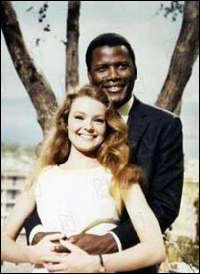 |
||
| Katharine Houghton and Sidney Poitier in "Guess Who's Coming to Dinner." |
||
| Columbia Pictures Corporation |
Though she's played The Glass Menagerie's Laura twice in the course of her long and varied career, until now the actress has never had the desire to take on Amanda. Recently Houghton spoke with Playbill.com about what drew her to The Pretty Trap, her many stage adventures, her auspicious start in films, and how she feels about the choices she's made in her career.
In reading a little a bit about The Pretty Trap, I was surprised to discover that it is quite different from what we all know to be The Glass Menagerie. Can you talk about some of the marked differences?
Katharine Houghton: Well, first of all The Pretty Trap is a comedy, and I don't know that anybody would ever call The Glass Menagerie a comedy. The four characters — the Tom and Laura and Gentleman Caller and Amanda are all called those same names, but they are all quite different especially the three family members. The Gentleman Caller has similarities to the Gentleman Caller in The Glass Menagerie, but there are differences, too, which I can't tell you because it will spoil it.
There's a happy ending, is there not?
KH: [Laughing] Yes there is a happy ending because all comedies have happy endings.
That's so far removed from what we know of this great autobiographical play.
KH: There's a story that may be apocryphal that somebody — and it might have been the wonderful Audrey Wood [Tennessee Williams' agent who became his friend and advisor] — said to Edwina Williams when she attended the opening of The Glass Menagerie, in 1944 in Chicago, "How does it feel, Mrs. Williams, to see yourself onstage?" And she turned and looked at Audrey, if it was Audrey — I'm not sure it was — but she turned and looked at the person in blank disbelief. She didn't know what she was talking about. I think that her disbelief or surprise that anybody would say that the Amanda in The Glass Menagerie, was like her is made clear when you see this play because it was probably written a couple of years before The Glass Menagerie, and it may have been closer to his actual family.
How does she differ from the Amanda in The Glass Menagerie?
KH: The Amanda in it is a very different kind of a woman. She's not nostalgic. She's not sentimental. She's a very much a feet-on-the-ground survivor.
And that appealed to you?
KH: That immediately attracted me to the play, to wanting to do it. This is a premiere, and it's a great honor and a great challenge to create a character who has never been articulated. Also the Laura is very different. She is not an invalid. She does not have a limp. She's a very strong. She's shy but she's a very strong, determined individual. And the dynamic between the mother and daughter, therefore, is evenly matched. Completely evenly matched.
I know you've played Laura a couple of times but never Amanda. Did you ever want to play that role in The Glass Menagerie?
KH: No, I never did want to play her because I don't like sentimental, nostalgic people. They annoy me. So I never had any interest in doing it. When Susan Charlotte sent me this play, I approached it with dread, but then I read it and thought, "Oh, my Lord, this is a completely different kettle of fish. This is a wonderful woman, I love this woman." I hope I can do her justice.
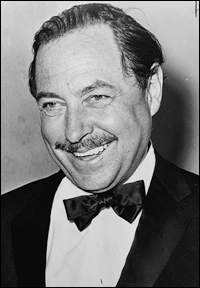 |
||
| Tennessee Williams |
KH: Yes. I was told Williams wrote this two or three years before he came up with The Glass Menagerie. Also this is a long one-act. It's not a full-length play. And he says in the preface that he's working on a play called The Gentleman Caller and that this is the second act of his play. Now I don't know what the first act is — maybe it's in his archive in the University of Texas in Austin. But what we're doing he describes as the second act of a play called The Gentleman Caller. To my knowledge, that was never done because ostensibly this is a premiere according to his estate. I have a feeling — and I may be wrong but my hunch is, having read quite a bit about his mother and his father and also his sister — that these people — the characters in this play — are closer to the truth about his family. Though that may make no difference whatsoever, but it's interesting to me that when he came to do The Glass Menagerie, he for artistic reasons distorted the actual nature of the people. So, for his mother not to recognize herself in the Amanda in The Glass Menagerie . . .
. . . Must mean something…I think most people might look at The Pretty Trap and assume the opposite — that the upbeat version was the one that was fabricated.
KH: It's not that this is a woman without faults. She, of course, has a lot of faults and vulnerabilities, which are very interesting the way they're written. She's mercurial and far from a perfect person. But what she isn't is insane or drenched in nostalgia in some sort of fanciful idea of her youth. I've talked to a couple of people who knew his mother quite well, and I've told them about this play and they've said that sounds much more like Miss Edwina—that's what they all called her. She lived to be a fairly senior citizen and was a strong, articulate, charming person.
You wear many different artistic hats—actress, playwright, and I know you co-founded a theatre company in Kentucky. Is that still operating?
KH: No, that ended in around 1981.
What brought you to Kentucky?
KH: Well, what brought me into that was I was working at Actors Theatre of Louisville and when my little group were not actually in plays during the season — you know, we'd do a show, and then we'd have a show off or something — we would get an Arts Commission grant, something they don't have anymore, but we would get an Arts Commission grant to go off to someplace that didn't get to see theatre and present a show that one of the members of our group put together called Shakespeare for Lovers and Others.
Where did you perform?
KH: We did that all over the place, in Kentucky, in South Carolina, in Mississippi, even at a Catholic college in Connecticut. It was really great fun. It was hard work, but it was great fun, and we had fabulous adventures. Then we wrote a few other shows or we co-opted some other shows like Dear Liar, and did them in Dayton, OH; Indianapolis; Yellow Springs, OH; and a few other places, and so on. It was a way of supplementing the work. We primarily were all working at Actors Theatre at that time, and instead of twiddling our thumbs waiting for the next show, we did this and it was great fun. As a footnote to this artistic company, I did the props. I'm very proud to say. I made masses of props for the Shakespeare by hand, and I loved doing that. I had never actually done that sort of work before, so that was one thing that was a special treat.
You were like a band of traveling players. What was the name of the company?
KH: This is a funny story. We called ourselves The Passionate Pilgrim Company originally because at the back of Shakespeare's plays there's the section called The Passionate Pilgrim. There's Venus and Adonis and The Passionate Pilgrim and I think one other section that's always in the compendium of Shakespeare's plays. Well the first time that I went to rent the truck for the company, so we could put all our costumes and sets in the truck, I filled out the form and the company, The Passionate Pilgrim Company. The guy looking it over was an older man, and he looked up at me and he said [affecting a Kentucky drawl], "Um, what're you gonna do in that truck?" So I went back to the company and I said, "We cannot call ourselves The Passionate Pilgrim Company because we may know what Passionate Pilgrim means, but it doesn't mean the same thing to the local people here, and we'd better change the name." So we called ourselves The P Pilgrim Company, but I love that story. I just think it's so funny. The look on my face — as if we were going to do something naughty in that truck — and the look on his face of, "Am I renting this truck out as a sort of traveling . . ." [Laughs]
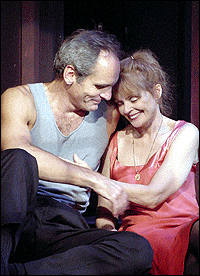 |
||
| Houghton and Anthony Newfield in Best Kept Secret. |
KH: For me, yes. There was definitely a quest to understand something. And by going through the process of writing it and acting in it, it did illuminate quite a lot to me about the nature of that story because it was somewhat autobiographical. Now, that's also true though, I think, with plays that are not necessarily autobiographical. The first play I wrote about Louisa May Alcott and her father . . .
To Heaven in a Swing?
KH: Yes. In writing the dynamic of that relationship of that father and daughter, it also taught me a great deal about my own life. So even though that wasn't my life, there was enough in it that was very familiar to me, that it also was just a very illuminating experience.
Alcott is also a character of sorts in another one of your works — your musical, Bookends.
KH: Bookends is really about the women [rare book dealers Madeleine Stern and Leona Rostenberg] who I knew very well — I knew them for 25 years — who discovered who Alcott was, so that's almost a footnote in the play. By "discovered who she was" [I mean] they discovered that Louisa May Alcott had a pseudonym, that she wrote wonderfully trashy stories under a different name, or anonymous, and they then actually, put that together by reading her papers that had in 1942 been donated to the Houghton library up in Cambridge. Then they went around and they found a lot of the stories that were published in things like The Flag of Our Union. But my focus in Bookends was really much more on them and the fact that at the end of their life, which is really when I knew them — the sort of last chapter of their life [Rostenberg died at 96 in 2005 and Stern at 95 in 2007] — they were very torn about whether to continue as rare book dealers because they started when the rare book business was really fairly new and fresh. Not that people hadn't been dealing rare books for hundreds of years, but there weren't any women in the field until they went into it, so they were pioneers. And books were not just commodities when they first went into the business. People really read them and loved them and different collectors were collecting different things depending on their interests. And talk about passion. There was a lot of passion in the business, and not just money. Then one of them, Leona, just said, "I don't want to do this anymore. I don't like what's going on in the book business, and I think we should quit." And the other one, Madeleine, really didn't want to quit. She thought this was their life, and if they quit what would they do? They'd just drop dead. So it's really more about them and their relationship to each other and to the book business and what to do about the fact that they just didn't really know how the future of books was going to turn out and whether anybody was interested in books anymore.
How would they have fared in the world of devices like Kindle and Nook?
KH: Yeah, that kind of thing. That was already coming . . . and should they have a web page and was there anyone to carry on their flag, so to speak. That's really more what that musical is about rather than Alcott.
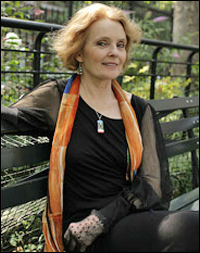 |
||
| Katharine Houghton |
KH: It's hard to say, to pick one. They're all so different. And they all involve such different experiences and different places and different people. Let me put it this way: There are very few roles I've played that I didn't like, that I felt under duress to have to do. And the only reason I ever did those roles was either that I was desperate to earn money or it was a tradeoff — a director saying to me in a rep company, "If you'll play this, I'll let you play Major Barbara." Something like that. Yeah, well, that's an actor's life, right? Especially in the theatre.
KH: Yeah. You have your tradeoffs, but by and large I really did get to play the roles that I wanted to play. And gosh I've had a helluva good time.
And what about as a playwright? Who would you say has had the most influence on you as a writer?
KH: I would certainly say my heroes are Shakespeare, Ibsen, Chekhov, O'Neill, Williams . . .
Oh, them.
KH: [Laughs] Oh, them, the obvious choices. And then here and there an extraordinary writer like James Saunders, who wrote A Scent of Flowers. Doing that play Off-Broadway for me many, many years ago was an extraordinarily wonderful experience. His creation of that girl — Zoe — it was just a part that I felt I was meant to play. It was just sort of destiny — Oh, my God, here's my part. With new plays, that happens rarely, where you read a part and you feel, I know exactly who this person is and what she's thinking and what she's feeling. With the classics, whether it's Nora or Kate or whoever, it's different because so many people have played them and you have a sense of how the story goes and you just feel a wonderful challenge of trying to give something, if possible, new to that part. But I would say, for me anyway, to meet up with a new play where I felt that the part was just absolutely perfect for me — that's been rare.
Have you ever been in a classic play that has been "reinvented," as sometimes happens?
KH: No, not in any drastic way. [Pause] Oh, Yes! Oh, YES! There is one. I forgot [laughs]. I did a production of Anouilh's Antigone in Nashville, Tennessee, and the director had the idea to set it in outer space. That was quite an experience. Fortunately I had a brilliant Creon, Tom Klunis — a wonderful actor, so sensitive and dignified and actually Greek! — who just held down the other end of the stage brilliantly, and we got through it, but it was pretty silly. [Laughs] Pretty silly.
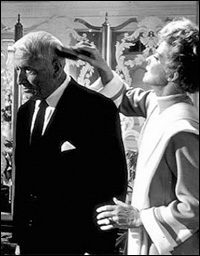 |
||
| Spencer Tracy and Katharine Hepburn in "Guess Who's Coming to Dinner." |
||
| Columbia Pictures Corporation |
KH: There are lots of feelings that I had on that set because of Spencer's health. Maybe there are still people who don't know that Spencer was dying the whole time we were making that movie. So there was a lot of tension on the set. And I think that because I was still very young and hadn't seen a lot of Spencer's and Kate's films— we didn't have Turner Classic Movies in those days—I really just knew them as Aunt Kat and Uncle Spence, and it wasn't the same kind of awe that one might have had if one were a consummate professional who'd been in the business and had a great track record like Sidney Poitier. Someone like Poitier, who would have known their work and about their standing in the industry . . .
KH: [For me,] it was more like making a home movie. However, the hard part of it was that they were both very stressed. Both Spencer and Kate were very stressed — Spencer because he was just trying to stay alive from one day to the next, and Kate because she knew what was happening. She wasn't an easy person to deal with in the best of circumstances. But under those circumstances, the tension level was just gigantic. I was there the day that Sidney did that, came into the library [to play that scene]. And they were sent home, and my aunt said later, "I don't blame him. Two old owls looking at him, I don't blame him for getting rid of us." But there was no rancor about the fact that they were sent home. She and Spencer totally understood. I was just too inexperienced and probably stupid to realize the situation I was in. I was more in awe of Sidney than I was of Spencer and Kate because I knew more of his work. I knew that my aunt and Spencer were great, were pioneers in the business and icons and all of that, but I didn't know their work. When I was a kid, I'd seen my aunt play As You Like It — and then not a heck of a lot. It's hard to imagine that one could be so ignorant of their legacy, but it wasn't available.
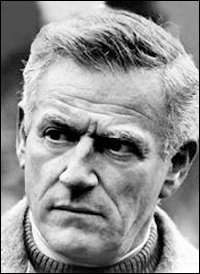 |
||
| Director Stanley Kramer |
KH: Right. I didn't know till after we'd made the film that Columbia Pictures hadn't wanted to make it. And Stanley told me later on that when he first broached the idea to Leo Jaffe, the head of Columbia at that time, he said it's a family picture, and we're going to get Sidney Poitier and Katharine Hepburn and Spencer Tracy. Well that all sounded fine, especially Sidney Poitier. He was the biggest of them all, the most bankable one at that point. And Jaffe kept saying, "Well, yeah, but Stanley, what's the plot?" And Stanley kept [putting him off] until finally he just had to say, "the daughter of Spencer and Kate brings home Sidney Poitier and the liberal family is faced with having to walk the walk and not just talk the talk." They said, "Oh. No. No, we're not making this movie." They tried to get out of the commitment by saying that Spencer could not be insured. And actually after we had shot the first day up in San Francisco, which was the only location shooting that was done, Kate called me and said, "The film has been cancelled because we can't insure Spencer." Well then they side-stepped the whole thing by telling Columbia that Kate, Spencer and Stanley said, "Okay we won't take any salary till this film is in the can."
And then the studio was stuck . . .
KH: Then they were stuck. They said, "All right, if we don't have to put any money into it" — because I didn't get paid much; $500 a week or something — then they said okay. But they had no faith that it was going to be a success. They thought it would be a bomb.
That's really amazing, that they really can't know those things and don't foresee them.
KH: There are a lot of films like that where the producers have no faith in them doing anything at the box office, and this was one of them. They just wrote it off.
Looking at it now it's hard to believe that it was so controversial at the time, but I guess it really was.
KH: Yes, it was very controversial. Even on the set, it was controversial. There were people involved in the making of the film that didn't approve of it. That I was aware of. It was very uncomfortable.
It was also an incredible opportunity for you. You were presented in that movie with such care. That's sort of unusual for a first time out. Was that your first film?
KH: It was my first big film. Not my first film, but my first big film. Someone told me a couple of years after the film came out that Sidney and I were huge stars in China. I just thought that was wonderful. I said, "Why?" And he said because even though they're all Chinese, they're all from different parts of that huge country, and if somebody from one part of the country wanted to marry somebody from another part of the country, there was a prohibition against it. So when they saw that film, they identified with it because of prejudice . . .
Yes, it's a universal subject . . .
KH: Yes. But it never would have occurred to me that this would have had relevance in China because you think, well they're all Chinese. No, they're not all Chinese. They're all different . . .
Well, isn't that good to know. That prejudice is everywhere . . .
Yes [laughs]. Doesn't that make your day?
You've done so many things in your career and traveled the world to do it. You seem to enjoy the diversity.
KH: I guess I've always liked to do lots of different things and probably if I had focused more on one thing or another I would have become more affluent than I am. But life is short, and there are just so many things in this life that fascinate me to do that I guess I've sacrificed fame and fortune to curiosity — to satisfy my curiosity.
Well that has its rewards, doesn't it?
KH: It does. It does. I'm very glad to have done all these different things. It's been a great adventure.
*
The Pretty Trap plays with a limited engagement through Aug. 21. For more information go to Cause Célèbre.










